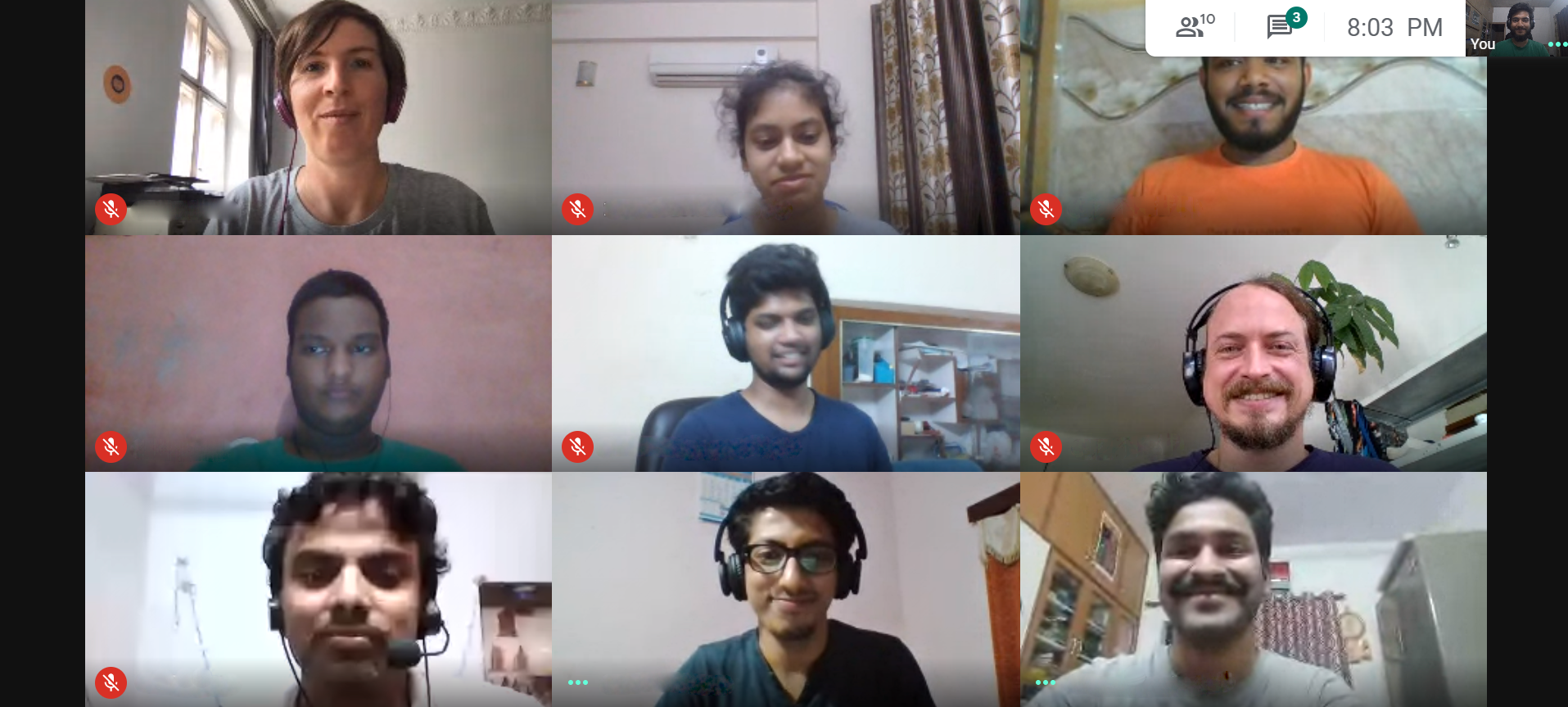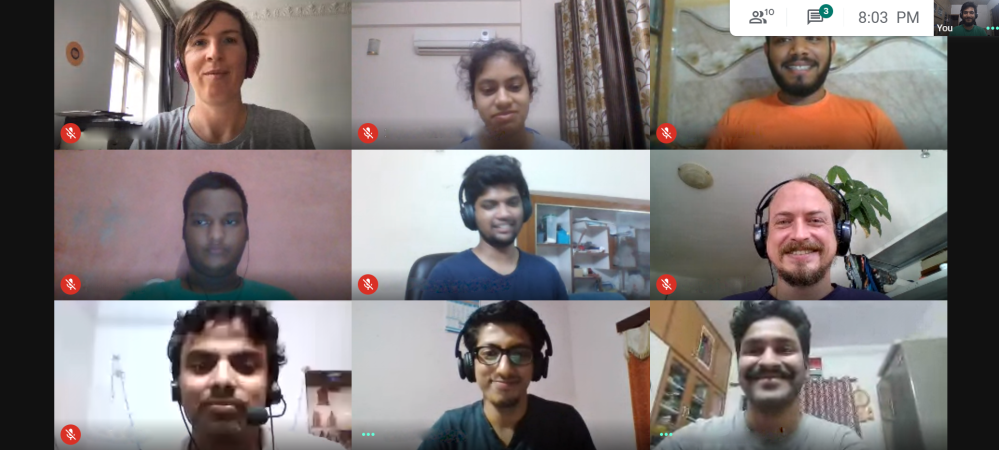Designing technical workshops for the Indic community
Background
Small Wiki Toolkits is an initiative for building technical capacity in smaller wiki communities. As part of this initiative, Wikimedia Foundation’s Developer Advocacy team planned an in-person workshop series to take place in June 2020 for a local Wikimedia community that might need it and would benefit from it. After conversations with 4-5 wiki communities, the team decided to co-organize the first workshop series with volunteers in India. Considering that there are emerging technical contributors in the Indic community, and IndicTech-Com exists, an initiative purely run by the volunteer community, the thought was that this workshop series would help augment the ongoing efforts. Also, as the Indic Wikimedia community is home to more than 22 language communities, the success of this workshop series would allow us to model a similar concept in another community quickly. Though the original plan was to coordinate this series in an in-person setting, due to the COVID-19 pandemic, it adopted an online format.
Workshop planning and design
Planning this workshop series seemed challenging initially, especially as we wanted to design an experience that supports running hands-on technical workshops in an online format smoothly. We wanted attendees not just to be passive listeners but active participants in these workshops. So, experimenting with different online meeting tools and finalizing one that would work best for facilitators, organizers, and participants was also crucial. In this post, we share detailed planning that went into designing different components of the workshop and lessons learned along the way so that it might benefit potential organizers or trainers interested in piloting a similar workshop series in their community.
Concept
In December 2019, Indic community members ran a Community Engagement Survey for planning WikiConference India 2020, though the event itself has been put on hold as well, owing to the pandemic. We used this survey to ask a few questions to help understand the technical needs and challenges of Indic community members and identify new technical skills they wanted to learn—responses from the survey indicated the following top 3 skills: writing user scripts and gadgets, writing Wikidata queries, and using Phabricator. Based on these responses, we finalized the workshop topics.
Registration and outreach
To announce the workshop series, we first set up a registration process and an event page on Meta-Wiki. On the registration form, participants could express interest in attending multiple workshops in order of their preference; we made it clear that the spots will be limited (15 per workshop) to allow mentors to handle the sessions more efficiently. We selected participants based on their preferred choices and motivations, and in the invitation emails, we asked them to sign the Meta-Wiki page to confirm their participation. With this, we quickly realized that the people who filled out the registration might not all show up, which is quite a regular pattern for online events, so we invited a few more people who we had on the waitlist for a particular session. For the outreach part, we wanted to ensure that we found and reached the people we designed this series for and shared this event with them. We spread the word on the Indic community mailing lists, village pumps, and Facebook groups where the Indian communities are majorly active. Then additionally, we also reached out to interface admins on their talk pages, who we thought could benefit particularly from the session on writing user scripts and gadgets—the skill most in demand as per the survey.
Running virtual workshops
We decided to use a combination of Zoom and Google Meet to conduct the online sessions, platforms that Indic communities seem to be most familiar with; using these, we could record and retrieve the sessions later easily and take advantage of cool moderation features for smooth facilitation. We recorded all the workshops except a discussion-based session on brainstorming the challenges of Indic communities to allow participants to feel more comfortable sharing their stories, thoughts, questions, and concerns. Slides and videos from all workshops are available on Wikimedia Commons and documented here on the workshops page along with the notes.
We also shared facilitation tips with mentors asking them to:
- Run a quick introduction round for participants to introduce themselves at the beginning of a workshop.
- Ask participants to turn their video off when not talking to ensure the call runs smoothly for everyone, especially for low-bandwidth users.
- Let participants know that the workshop will be recorded so that they can raise any concerns they have.
- Share a friendly space policy or the Code of Conduct for Wikimedia technical spaces.
Reminders, follow-ups and feedback surveys
We had sent at least two reminders to all the participants a day and an hour before and a follow-up email after the workshop. In this follow-up email, we included workshop materials (slides, notes, and recording), an invitation to reach out for support for conducting similar training in the future, a feedback survey to help understand the usefulness of such workshops, and, most importantly, a few follow-up tasks for attendees. For example, for the user scripts and gadgets workshop, mentor Jayprakash put together a few small tasks. We asked attendees to work on these tasks, share their solutions, and ask related questions to the mentor directly via email.
Participant demographics
In May 2020, a call for participants had been sent to Indic Wikimedia communities, and participants were selected based on their preference, background, and motivations to participate. Altogether, in the four sessions, there were 26 unique participants, and the total number of participants was 42 (i.e., an average of 10 participants per workshop). In terms of diversity, we had one participant from each language community, with the exception of Bengali, Gujarati, Hindi, Malayalam, and Santali, from each of which there were two people, and five Wikimedia technical contributors.

This series could have done better on the gender diversity front, as only 10% of all the participants were women—which is a reflection of women and non-binary individuals in general in Wikimedia technical spaces, especially in India. However, out of the five technical contributors in the series who participated, 60% were women; they are not directly associated with the communities in India, but through Google Summer of Code and similar programs.
Key outcomes
While the three workshops “Writing user scripts and gadgets”, “Writing Wikidata queries”, and “Using project management and bug reporting tool Phabricator” focused on capacity development as evident from their titles, the fourth entitled “Understanding the technical challenges of Indic language wikis” focused on brainstorming the Indic community’s challenges. Participants reported that their skills and awareness increased by 30%, on average, and 8% percent of the participants said their familiarity with a technical topic increased by 60% after the workshop1. These percentages indicate the workshop series made a decent impact on the technical front of Indic communities. Improvement indicates the participants have gained new skills they can build upon and that was the intent of these workshops.

Success stories
- Upon encouragement from the mentor and other participants in the “Understanding the technical challenges of Indic language wikis” workshop, User:Jayprakash12345 applied for global interface admin rights (which is usually not easy to obtain), and his nomination was successful.
- Also, during this workshop, Malayalam and Konkani users reported that the Wikipedia:Twinkle gadget had been broken on their Wikipedias since a new update. Also, improper functioning of citoid on Malayalam was reported. As of July 2020, all issues reported from Malayalam have been fixed.
Observations and evaluations
What worked well?
- On average, the overall quality and usefulness of the series was rated 4.2 out of 5, which is a positive sign.
- The participant turnout (50-60% of selected) for the workshops was quite good, considering that they were online and amidst the pandemic. We think that keeping a selection process helped generate some commitment to attend the sessions.
- Limiting workshops to 15 participants was helpful for mentors to manage the sessions better. Though we never reached the maximum capacity, it was still a good measure to have limitations, as more numbers may have negatively affected the quality of these sessions.
- It was a great learning experience for the organizers to understand the dynamics of conducting a series of online workshops to have an impact equivalent to a two-day physical event.
- It helped us understand the technical landscape of Indic wikis—contributors, their challenges, perspectives, and interests.
- Participants reported that they would be using their learnings from these workshops in the following ways—building bots, importing gadgets into their local wikis, developing new gadgets, creating wikidata queries to use on their local wiki, among several others.
- Upon asking for additional feedback, we got the following responses, which indicate the value of these workshops and a need for their continuation, more so when designed with a specific local community in mind:
“I am looking forward for the “Understanding the technical challenges of Indic language wikis 2.0” session and such sessions should be arranged at least once in a month where we can discuss and solve issues facing by our Indic community.”
“The session was useful and moreover it was in Hinglish (A mix of Hindi and English) and I feel it was more adaptive for me to understand. The workshop started with the basics, which really helped me. Workshop was so interesting that some of the attendees were eager to learn more even after workshop time limits. I think it should not [be limited] to one session.”
“Overall experience of [the] workshop was excellent and I would say that such [a] kind of workshop should be organised frequently.”
What could be improved?
- Participation rates of female and non-binary individuals could be improved. This could be done by proactively reaching out to them during the call for participation phase.
- All the sessions overshot their actual end time, and in some cases, it was 50% more than what was planned for. As it was the first time, time required was not well calculated—if required it is better to break down into two smaller sessions, with a break in-between.
What’s next?
The Developer Advocacy team will soon be publishing lessons learned from the first year of the Small Wiki Toolkits initiative, including lessons learned from this workshop series. The team is also considering the technical challenges shared in this workshop series for planning new activities and projects to be engaged as part of the initiative. If a plan specific to the Indic communities is required, the workshop series organizers will take that on. The next steps will be announced on the Wikimedia-I/Wikitech-I mailing lists and via other communication mediums, hopefully by the end of September, so stay tuned!
Credits: Thanks to Jayprakash, Mahir, Birgit, Andre, and Satdeep for their massive help in mentoring and facilitating these workshops and to Alex for copy-editing this post!
About this post
Feature image credit: Participants from one of the Indic workshops, Satdeep Gill, CC BY-SA 4.0
1Percentages were based on a post-event survey, to which 24 of the 42 participants responded. As the response rate was 57%, it was deemed substantial enough to represent all the participants, and “participants” was used in place of “respondents”. This is applicable to further sections as well.

Great workshop